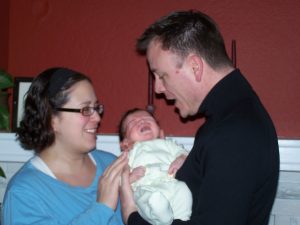The Dark Side of Motherhood: It Does Get Better
When I was pregnant with my son, I was was incredibly anxious during the entire pregnancy. I had miscarried before and was so worried that my heart would be broken again that I was on constant alert. I felt that if he was born, I would do everything in my power be a good mother. I had always thought I would be a “natural” and would instinctively know how to parent.
My son was born a month early and by the time I got to the hospital I was eight cm dilated. I was in shock that he was coming so quickly. When he was born it was a very special moment, and I was so grateful to have him. He had a great APGAR score and it seemed clear he was strong and healthy. As I began to relax and started to get acquainted with my son, I was horrified to learn that he had to spend the night in the NICU because he was grunting and not breathing properly. I was again devastated and so worried that something was wrong. I felt helpless.
Luckily, he was able to go home after being observed overnight. Nurses tried to help me with breastfeeding before I was discharged, but it was not what I expected. I had a hard time feeding my baby even after taking classes and reading books prior to his birth. I was still hopeful that with some help from a lactation consultant, I would get the hang of it.
Once I got home, my mother, who is also a nurse, stayed with us for a week. I was relieved to have guidance and support. Breastfeeding was not going well. I could not help my son latch, I was not producing enough milk, and I was exhausted from pumping eight times a day and producing little milk.
We were told that he was losing too much weight and that we needed to supplement with formula. My son had a difficult time latching onto a nipple from a bottle, as well. I was again really worried about his weight loss and felt like a failure for not being able to breastfeed. I kept trying but nothing was changing.
As I got to know my son, it was evident he was not an easy baby.
I walked into motherhood believing that babies cry for a reason, and if you can figure out what is wrong, you can soothe them.
Well, this is not what happened. I did everything I knew how to do and nothing helped. My son didn’t just cry, he wailed. It hurt my ears and it made my skin crawl. I just wanted him to stop. He also did not sleep well. I had to walk him, swing him, and bounce him for hours in order for him to sleep. When he did nap, it was for 30 minutes. My husband and I felt like zombies.
I tried to find support in a mother’s group for new moms. I ended up feeling really out of place. My son was the only wailing baby while the other babies either slept peacefully in their mother’s arms or cried briefly and then settled. I worried about being judged as I had to pull out my formula and feed my baby while the other mothers nursed their babies. I had given up breastfeeding after a couple of months because all it did was make me cry and feel inadequate. I felt like a huge failure when I stopped breastfeeding. It seemed everyone else pushed past the physical pain of breastfeeding and their bodies made the milk their babies needed. I felt so alone.
I got sadder and sadder as time went on. I was convinced my son was not bonded to me. I imagined he smiled for my husband but not me. He was not easily soothed and did not respond to touch and cuddles like I imagined babies would. I did not experience that sweet tenderness between mother and child like you see in the baby ads. My baby squirmed and relentlessly cried. The doctors thought he had acid reflux but the medicines they gave me did not make a big difference.
At about 6-8 months he finally became more interactive and engaged. I could bond to him and enjoyed him much more.I wish back then that I knew that things would change and that one day I would have a loving and bonded relationship with my now 8 -year-old son–even though he is still an emotionally intense, sensitive guy!
I wish that I knew more about what postpartum mood disorders looked like.
My OB asked if I was depressed when she screened me and I said “no.”
Looking back I was dealing with so much more than that simple question could determine.
I wish I knew the faces and stories of moms struggling like I was. When I watched a beautiful video project on Motherhood, “Mothers Rising Strong,” I wanted to cry. Not only could I relate to these mothers, I also realized that I have never shared my story.
My hope is that more mothers will speak up and have their stories told, that obstetricians will include a more thorough empirically tested screening for perinatal mood disorders, and that mothers can feel safe enough to be more emotionally transparent.
While everyone’s experience and emotional response to motherhood may be different, we are not alone.

